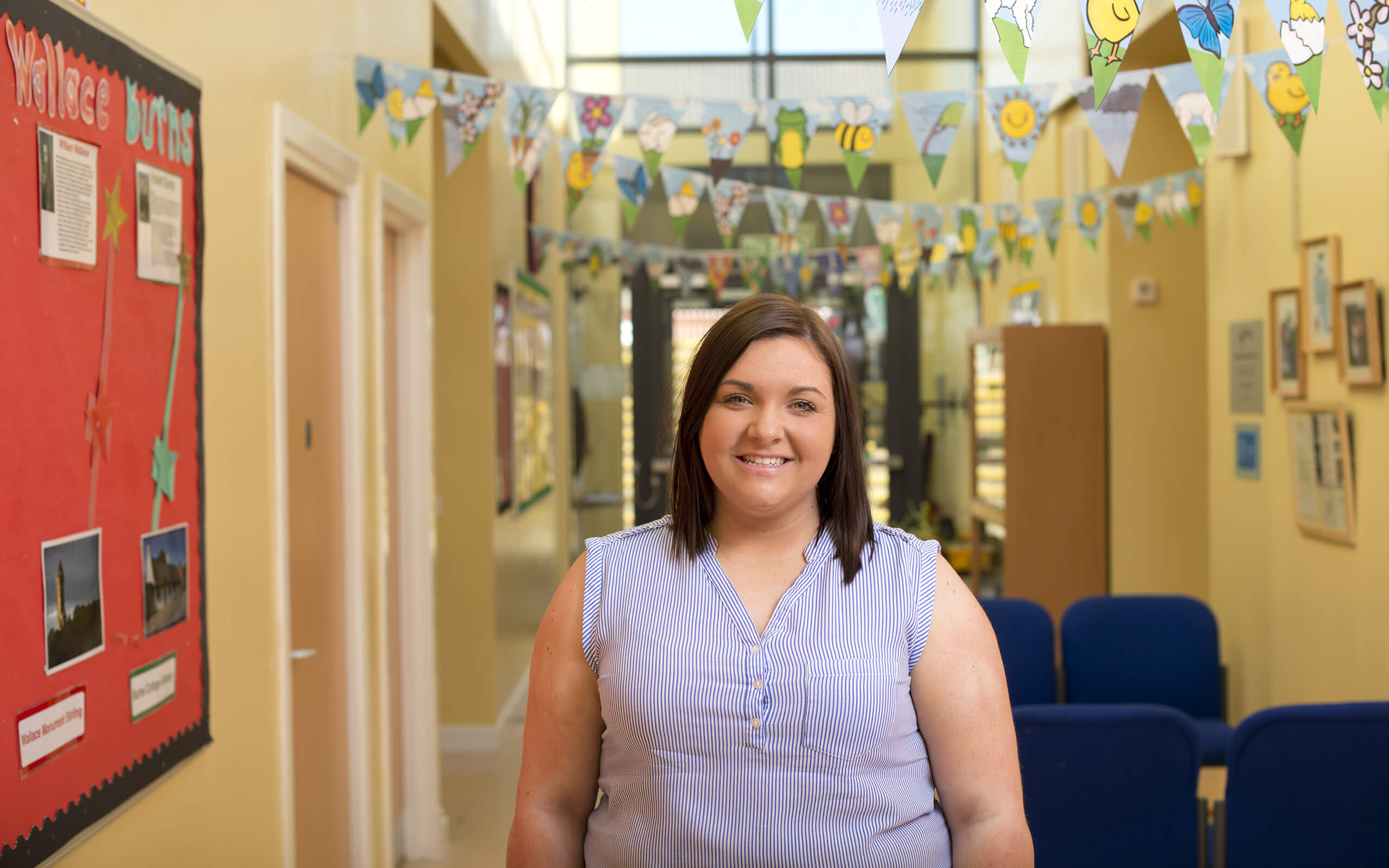PGDE (Primary)
Award
PGDE
Duration & study mode
9 months, full-time
School
Education & Social Sciences
Location
Ayr, Lanarkshire
Additional information
Course starting dates
-
Ayr: August
-
Lanarkshire: August

This PGDE (Primary) provides the formal teaching qualification for provisional registration with the General Teaching Council for Scotland (GTCS). It gives you the skills, knowledge and experience to build a career as a primary school teacher.
You will cover a wide range of subjects that feature in the primary school curriculum including English/Literacy, Health and Wellbeing, and Mathematics/Numeracy.
The PGDE enables you to develop core skills in planning, teaching, assessment and evaluation strategies, classroom organisation, building relationships in the classroom, and contemporary issues in Scottish education.

18 weeks of school experience placements occur in at least two primary schools/education and childcare settings within local authorities in Scotland. These placements occur in each school term.
Most UWS graduates remain in mainstream teaching in the UK or abroad. Others work in specialist educational areas including working with children with additional learning support needs, adult training, museums, writing and publishing, health education, curriculum development, and social services.
Successful applicants who gain a place on this programme are required to register on the Protecting Vulnerable Groups (PVG) Scheme, managed and delivered by Disclosure Scotland.
Postgraduate Taught Experience Survey 2017

The Division of Education at UWS is recognised as one of the most innovative providers of education degrees in the UK. From early years to adult education, students gain rich experience from our innovative courses and graduate with unrivalled career prospects.
Our research informs our teaching courses, influences policy and contributes to wider research networks across the world. Our work into the nature and causes of youth violence, crime and gang culture has had an international impact.
We welcome Scottish, UK and international students and consider all applicants on an individual basis.
If you are applying with an EU or non-EU qualification, please check our Postgraduate Entry Requirements page which gives more information about country-specific entry requirements.
Given the competitive nature of PGDE Primary the School shall only consider applicants who already hold an Honours degree that has been validated by a university in the UK or an Honours degree of an equivalent standard from outside the UK, plus have Scottish Higher English at Grade C or above, or equivalent. In addition applicants must also be qualified in Maths at SCQF Level 5 - SQA National 5 (Grade B), SQA Intermediate 2 (Grade B) or SQA Standard Grade (Credit), or equivalent.
As a result any applications that are received with any of these pending qualifications shall unfortunately be rejected.
You are advised to visit both the The General Teaching Council for Scotland and Teach in Scotland websites for full information on what is required to become a teacher in Scotland.
You are also advised that recent experience of working/assisting in a Scottish primary school classroom is normally required and is certainly desirable.
A bachelor's (preferably at Honours level) or a master's degree that is validated by a university in the UK, or a bachelor's or master's degree of an equivalent standard from outside the UK.
In addition, applicants must either have, or be awaiting the results of the following:
For a list of acceptable alternative qualifications in English and Mathematics, please consult Appendix B of the General Teaching Council for Scotland’s Memorandum for Entry to Initial Teacher Education: memorandum-on-entry-requirements.pdf (gtcs.org.uk)
Note: We will accept alternate International qualifications in English and Mathematics where evidence is provided via NARIC (National Recognition Information Centre).
Attainment of the minimum entry qualifications does not guarantee that the application will progress as competition for limited places is extremely high.
An offer of a place on this course is made on the basis of your application and successful interview.
Candidates who meet the academic requirements will be considered for interview. The interview is designed to enable applicants to demonstrate their interpersonal skills; ability to communicate; insight into the role of a teacher; knowledge about current Scottish primary education. Recent experience of a Scottish primary school classroom is normally required and is certainly desirable.
Successful applicants who gain a place on this course will need to register on the PVG Scheme, managed and delivered by Disclosure Scotland. An application form will be sent from the University once you have accepted your offer. The fee for joining the scheme is £59.
Visit the Disclosure Scotland website for more information on the PVG scheme.
All academic degrees/awards at UWS are taught in English. For applicants whose first language is not English*, the University sets a minimum English Language proficiency level. All English language qualifications must have been gained within two years of the start of your UWS course.
* applicants who are exempt from english language requirements include:
In general terms, if you are applying to study a course at, or above, Year 1 (SCQF Level 7) bachelor’s degree level, then the UKVI’s minimum level of English proficiency is Common European Framework for References of Languages (CEFR) at B2 (Upper Intermediate).
At UWS, we define our general English language requirements using the International English Language Testing System (IELTS) Academic module (not General Training) as follows:
These are minimum requirements and some courses may require a higher standard for admission†.
† Exceptions to this level of IELTS scoring exist for some accredited or professionally-recognised courses (see IELTS Score Exceptions section below for more information).
For our research degrees (MRes, MPhil, PhD, DBA, DProf) applicants are required to have an IELTS score as follows:
For Health, Nursing & Midwifery courses that lead to professional registration with the Nursing & Midwifery Council (BSc Adult Nursing, MSc Adult Nursing, BSc Mental Health Nursing, MSc Mental Health Nursing, BSc Midwifery and MSc Midwifery), applicants are required to have an IELTS score as follows:
Our BSc Paramedic Science degree leads to professional registration with the Health and Care Professions Council (HCPC); it has different IELTS requirements than other Health-related courses. Although it is not possible to apply for this degree directly as an international student, for applicants who meet SAAS residency requirements and for whom English is not their first language, then the following IELTS scores are required:
For our BSc (Hons) Applied Biomedical Science, BSc (Hons) Biomedical Science and MSc Advanced Biomedical Science degrees, which may lead to professional registration with the Health and Care Professions Council (HCPC), applicants are required to have an IELTS score as follows:
Our BA (Hons) Social Work and MSc Social Work degrees are professionally recognised by the Scottish Social Services Council and applicants are required to have an IELTS score as follows:
For our Certificate of Higher Education courses, applicants are required to have an IELTS score as follows:
In additional to IELTS, we also accept a number of alternative English language for application and admission to our courses for both home/EU and international students at bachelor's degree study at Year 3 (SCQF Level 9), and above. From Cambridge to TOFEL iBT qualifications the number of these qualifications is extensive.
Find out about non-IELTS English Language Tests
UWS has also reviewed a range of High / Secondary School qualifications studied by non-EU applicants that can be used as a basis of entry to a UWS. These range from Botswana GCSEs to USA High School Graduation Diplomas, the number of these qualifications is extensive.
Find out more about international English Language high-hchool qualifications
Applicants who do not meet the minimum English language requirements have the option to study one of our preparatory and pre-sessional English courses. The UWS courses available are:
You will cover a wide range of subjects that feature in the primary school curriculum.
The PGDE Primary is an intense course, comprising 18 weeks of university teaching and 18 weeks of placement in primary schools. The main pedagogy is interactive lectures and workshops. Collaborative tasks and group learning are integral to the programme.
The course comprises three core modules:
All modules are studies at SCQF Level 10. Students have the opportunity to be assessed at Level 11 in School and Professional Studies.
For the Professional Graduate Diploma Education (PGDE), you will study the following modules:
Plus:
Or:
The PGDE Primary programme is an intense course, comprising 18 weeks of university teaching and 18 weeks of placement in primary schools.
The main pedagogy is interactive lectures and workshops. Collaborative tasks and group learning are integral to the programme.
ASSESSMENT
The module Primary Curriculum is assessed by both examination and assignment.
The module School Experience is assessed based on the GTCS Standards for Provisional Registration.
The module School and Professional Studies is assessed by assignment.
Programme Specification and Module Descriptors for Undergraduate and Postgraduate courses are available to download (PDFs). These provide you with core information concerning your chosen subject.

You receive the formal teaching qualification necessary for provisional registration with the GTCS, a requirement for entry into the guaranteed one-year Teacher Induction Scheme.
Most UWS graduates remain in mainstream teaching in the UK or abroad. Others work in specialist educational areas including working with children with additional learning support needs, adult training, museums, writing and publishing, health education, curriculum development, and social services.
£1,820 cost per year of study (usually paid by the Scottish Government via SAAS*)
£9,250 Cost per year of study, but not more than £27,750
£9,250 Cost per year of study, but not more than £27,750
£15,500 per year of study
PGDE programmes are funded in the same way as undergraduate programmes. You can apply to SAAS to have tuition fees paid. Eligibility conditions apply. Check SAAS for more information.
To apply for the PGDE you must apply through UCAS. All PGDEs in the UK are classified as undergraduate courses for the purposes of application/admissions even though you must have at least a Bachelor's/undergraduate degree to apply.
All UK and EU applicants for undergraduate study, not applying through an agent or partner, should apply through UCAS (Universities and Colleges Admissions Service)
The on-time application deadline for 2024/25 entry is 31 January 2024, 18:00 (UK time). For some courses it may still be possible to apply beyond this period, subject to suitable vacancies remaining. The final deadline for late applications via UCAS is 30 June 2024. Beyond this deadline, you may be able to apply via ‘UCAS Clearing’ if the course you are interested in has remaining places.
Please refer to our Undergraduate Application Guide for domestic & EU/EEA to find more information on when and how to apply to study at UWS.
Students from non-EU/non-EEA countries can apply directly to UWS via our dedicated online application system. The latest we can process your application is 6 weeks before the course start date to allow for visa processing times. For more information on when and how to apply to study at UWS please refer to our International Undergraduate Application Guide.
For part-time & online study, you should apply directly to the University through our online application system, not through UCAS. Please select the part-time mode of study when submitting your application. Before you begin your application, it is important to read the part-time application step-by-step guide for a smooth process.
To come to UWS as a visiting student on a study abroad or exchange programme, you must apply entirely through our online system.
An ATAS certificate is not required for overseas students applying for this course.
Do you have a question about applying for this course? Get in touch. We are here to help!
We will always try to make sure that we publish accurate course information but we do not accept responsibility for any mistakes or omissions. We will also try to make sure that we deliver our courses in line with our published information. However, we may not always be able to do so and you can find further information about this in our enrolment terms and conditions.